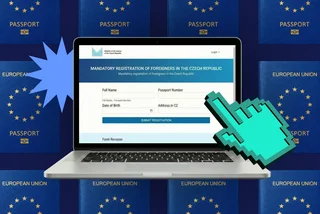Getting divorced can be an incredibly difficult and confusing experience no matter which country you call home. While navigating bureaucracy can be tiresome at the best of times, it can cause even more anxiety when you add to it the emotional stress of a relationship breaking down in a foreign country.
The first and most important step for anyone to take when considering divorce in the Czech Republic is to arm oneself with information – finding a good lawyer to take your case can be half the battle and reduce the emotional toll on both you and your spouse.
We spoke with JUDr. Markéta Allnutt, a Prague-based divorce attorney with more than 10 years experience helping couples from all backgrounds move forward with making their separation a legal one. She explained the steps to take, the documents you'll need, and the two types of divorce in the Czech Republic.
What constitutes grounds for divorce in the Czech Republic?
The first condition that constitutes grounds for divorce is that your marriage must be "irreparably broken" meaning that the marriage is beyond repair. Reasons for the marital breakdown can include:
- Your partner is involved in another relationship
- You live apart
- You live together, but lead separate lives
- Your partner behaves toward you in a way that makes it impossible to stay together (e.g. verbal abuse, insults, threats, refusing to share expenses or physical abuse)
Do you need to have been married in the Czech Republic to get a divorce in the Czech Republic?
Allnutt says it often surprises people to find out that you don't have to have been married in the Czech Republic to be divorced in the Czech Republic. She notes that it doesn't matter what nationality you are or where you were married; you can annul your marriage in the Czech Republic given that it is "irreparably broken" and you fulfill certain residency conditions. Among them:
- You or your spouse has residency (doesn't have to be permanent) in the Czech Republic at the time of divorce, if you lived in the Czech Republic as a married couple.
- At least one of the spouses has residency in the Czech Republic and you can file a joint petition for the divorce (meaning both spouses agree with the divorce).
- You have residency in the Czech Republic for at least one year before filing the proposal for the divorce.
What documents will you need to file?
- Your marriage certificate (potentially apostilled if you were married outside of the Czech Republic and translated by a certified translator)
- Birth certificates of your children (if you have any)
Will the divorce affect my residency?
If your residency in the Czech Republic depends on marriage, there is sometimes an option to keep the same type of residency based on your children’s nationality, or in some cases, you can switch to another type of residency, based on your employment.
Will the divorce be valid in my home country?
- Ask the court for the legal stamp (which confirms that there is no appeal possible)
- Get the decision either apostilled or go through a super legalization process (this will depend on the treaty between the Czech Republic and your home country).
What are the different types of divorce in the Czech Republic?
Once you – or both of you – have determined that you would like to get a divorce, the next step is to contact a lawyer. Once you've found a lawyer, there are two main types of divorces.
Settlement divorce
If the marriage lasted at least 1 year, and both partners mutually agree that the union has been in a state of being irreparably broken for at least six months and divorce is the only solution, you can file for a settlement divorce.
Prior to signing a divorce agreement, you must settle a number of primary issues regarding the division of property and assets, custody if you have children, and spousal support.
In the Czech Republic, property obtained during the marriage and debts is split 50/50, with a few exceptions (e.g. gifts, inheritance, compensation for a health injury, etc.)
Child support is paid by the non-residential parent to the parent who has a child in his/her custody. The amount can differ based on the age of the child and his needs (e.g. it depends on hobbies, health condition of the child) and the financial situation of the non-residential parent. When the custody is shared by both parents that could mean that there is no alimony obligation for one or both parents.
When it comes to child support, you and your partner will need to agree on the following:
- Where the children will live
- How much time they’ll spend with each parent
- How you’ll financially support your children
Under Czech law, both spouses in a marriage should have equal standards of living. Before a divorce is finalized, it is possible for one partner to claim alimony (it's usually for the wife but not always.)
Obtaining alimony after a divorce is difficult. This would be for cases when the spouse could not earn money after the divorce, for example, if they were a full-time carer for the children.
If you can agree on all of these issues, you can sign an agreement with a lawyer. This agreement then goes to the divorce court, where in the vast majority of cases it is approved.
Contested divorce
Sometimes, however, partners cannot agree and in this case, the divorce would be a contested divorce. There are three primary parts involved in this process, which are normally decided by the courts:
- Where and with whom children will live, how much time they will spend with the non-residential parent; plus the amount of child support.
- Suitability, in which the court decides if both parties meet the conditions for divorce.
- The division of property and debts.
If necessary, there is an option to get a court decision during the divorce process (a preliminary decision, which is in effect until the final decision). This might be the case, for example, if one parent is preventing the other parent from being in contact with the children, or stops supporting the family financially, or is behaving in an abusive way.
There is also an option to apply for a decision that prevents a spouse from living in the shared household for 7 days, which is possible to prolong up to 6 months, in case the spouse is abusive.
Allnutt says that anyone who's fearful about filing for divorce in a foreign country should know that Czech lawyers are used to dealing with clients who are embroiled in highly charged emotional situations.
Many are trained in mediation techniques. While they are not therapists, their purpose is to make the bureaucratic and negotiation process as painless as possible so as to reduce the emotional burden on all parties in the divorce.
This article was written in cooperation with Prague-based attorney JUDr. Markéta Allnutt, whose English-speaking law firm provides comprehensive legal support in Commercial and Real Estate Law, Family Law, and Damages to businesses and expats in all areas of the law. Read more about our partner content policies here.












 Reading time: 5 minutes
Reading time: 5 minutes 

























